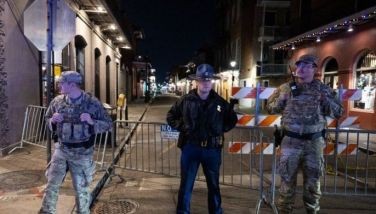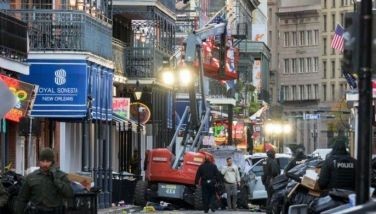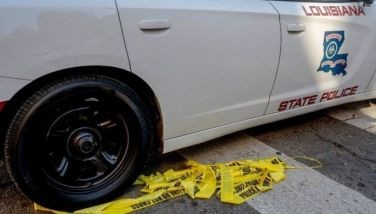Ukraine mayor shot, US announces new sanctions on Russia
KIEV — The mayor of Ukraine's second-largest city was shot in the back yesterday and hundreds of men attacked a peaceful pro-Ukraine rally with batons, bricks and stun grenades, wounding dozens as tensions soared in Ukraine's volatile east.
One presidential candidate said the mayor was deliberately targeted to destabilize the entire city of Kharkiv, a hub of 1.5 million people.
Armed insurgents tacitly backed by Moscow are seeking more autonomy in eastern Ukraine — and possibly even independence or annexation with Russia. Ukraine's acting government and the West have accused Russia of orchestrating the unrest, which they fear Moscow could use as a pretext for an invasion.
Ratcheting up the pressure, President Barack Obama's government levied new sanctions yesterday on seven Russian officials and 17 companies with links to President Vladimir Putin's inner circle. The US also revoked licenses for some high-tech items that could be used by the Russian military.
In Brussels, the European Union moved yesterday to add 15 more officials to its Russian sanctions list to protest Moscow's meddling in Ukraine. That decision, reached by the ambassadors to the EU's 28 nations, was being formally confirmed by the EU's governments, officials told The Associated Press.
In the eastern city of Donetsk, about 1,000 demonstrators carrying Ukrainian flags marched through the streets to hold a pro-Ukrainian rally yesterday night. They were attacked by several hundred armed men shouting "Russia!"
Police attempted to hold the pro-Russia men back but then largely stood aside as dozens of protesters were battered.
Hennady Kernes, the mayor of Kharkiv, was shot in the back yesterday morning while cycling on the outskirts of the city, his office said. He underwent surgery and was reported by the hospital to be in "grave but stable" condition.
Officials have not commented on who could be behind the attack on the mayor — but Kernes was a man who could have angered both sides.
Kernes' friend and former Kharkiv governor, Mykhailo Dobkin, told journalists the attackers had aimed at Kernes' heart and wanted to kill him to destabilize the city
"If you want to know my opinion, they were shooting not at Kernes, but at Kharkiv," he said.
Dobkin is among several candidates running in Ukraine's May 25 presidential election, which the interim government says Russia is trying to derail.
Kernes was a staunch opponent of the pro-West Maidan movement that toppled President Viktor Yanukovych in February and was widely viewed as the organizer who sent activists from eastern Ukraine to harass demonstrators in Kiev.
But he has softened his stance toward the new Kiev government. At a meeting of eastern Ukrainian leaders and acting Prime Minister Arseniy Yatsenyuk earlier this month, Kernes insisted he does not support the armed pro-Russia insurgents and backed a united Ukraine.
Kharkiv is in eastern Ukraine, where pro-Russia gunmen have seized government buildings and police stations and set up roadblocks to demand greater autonomy or even annexation by Russia. But unlike the neighboring Donetsk region, Kharkiv had been largely unaffected by the insurgency — something Kernes has been credited with. Its administration building was briefly seized earlier this month but promptly cleared of pro-Russia protesters.
The Russian Foreign Ministry said the attack on Kernes, along with other events, "indicates that it isn't possible to speak of any 'peaceful' pre-election campaign in Ukraine."
Elsewhere in the east, pro-Russia militants wearing masks gained another foothold, seizing a city hall building and police station in the city of Kostyantynivka, 160 kilometers (100 miles) from the Russian border. The city is 35 kilometers (22 miles) south of Slovyansk, a major city that has been in the hands of insurgents for more than three weeks.
After the seizure, about 15 armed men guarded the city hall building. Some posed for pictures with residents while others distributed St. George's ribbons, the symbol of the pro-Russia movement.
Moscow has repeatedly pushed for a referendum on federal autonomy in Ukraine, but Kiev and its Western allies have refused, accusing Russia of fomenting separatist sentiment in an attempt to foil the May presidential vote.
However, Justice Minister Petro Petrenko said the parliament in Kiev would debate the idea of a referendum on Tuesday, Interfax news agency reported.
The increasingly ruthless pro-Russia insurgency, meanwhile, is turning to an ominous new tactic: kidnapping. About 40 people are being held hostage in makeshift jails in Slovyansk — including journalists, pro-Ukraine activists and seven military observers from the Organization of Security and Cooperation in Europe, Ukraine's Security Service said yesterday.
The German government called yesterday for the immediate release of the European military observers, who were detained Friday on allegations they were spying for NATO.
Pro-Russia militants in camouflage and black balaclavas paraded some of the captive military observers before the media on Sunday. They also showed three Ukrainian security guards bloodied, blindfolded and with their arms bound.
On the other side, Russia's foreign ministry said Ukraine's efforts to detain pro-Russia activists has turned into the "mass persecution of dissenters." The foreign ministry also said it had information that Ukraine was building large temporary detention centers for these prisoners.
"Those structures being constructed very much remind one of fascist concentration camps," the Russian statement said.
- Latest
- Trending
































